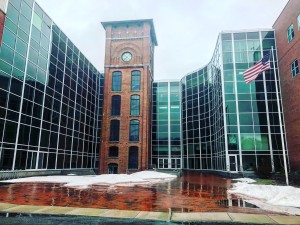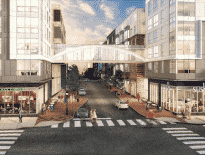
After acquiring the former Polartec factory in December, Jitender Makkar plans to introduce vertical farming while converting the 560,000-square-foot complex into a multitenant industrial space.
He’s studied architecture, urban planning, real estate investment and brokerage, and most recently, the nuts and bolts of vertical organic farming.
As the new owner of the sprawling former Polartec factory on the Lawrence-Methuen border, Jitender Makkar also will be its first tenant. Since acquiring the 560,000-square-foot complex in December for $5.8 million, the California real estate broker is preparing to activate a portion of the currently vacant buildings growing basil, lettuce, herbs and microgreens at his newly formed company, Beyond Organic. A Dutch manufacturer’s vertical growing equipment – compatible with the building’s 31-foot clear heights – will fill 30,000 square feet in a section of the first floor. Working with brokerage Avison Young’s Boston office, Makkar is recruiting manufacturing tenants to fill the rest.
Finding a way to replace hundreds of jobs lost when Polartec’s owners deactivated the plant and shifted operations to New Hampshire and Tennessee in 2016 is a familiar topic for Makkar, whose family was involved in manufacturing and farming in his native India. As a college architecture student, he studied economic development strategies in the southern Indian city of Aleppey.
“Bringing a revival to something that is declining and decaying was something I aspired to from that point on,” he said. “How does a city become a city, and what causes something to fail?”
At his new acquisition, which he renamed IndusPAD, Makkar is pursuing a multi-tenant redevelopment strategy. He’s using his architectural background to study how to break up the massive floor plates for most efficient reuse, and estimates the two-building complex can accommodate up to a dozen tenants ranging from medical research to food processing.
New Chapter in Malden Mills History
The former site of Malden Mills Industries, the pioneering manufacturer of lightweight fleece apparel, 46 Stafford St. became a widely celebrated case study in corporate responsibility after a December 1995 fire destroyed three buildings and idled the plant’s production.
Then-owner Aaron Feuerstein kept the 3,000-employee workforce on the payroll and company health insurance while rebuilding the factory on the 15-acre site overlooking the Spicket River.
Feuerstein’s decision threw a lifeline to the Merrimack Valley manufacturing economy. But a pair of bankruptcy filings in 2001 and 2007 placed the future of Malden Mills in doubt and a Philadelphia private equity firm now known as Versa Capital Management acquired the company in the second proceeding.
Versa said in 2016 that the location was unprofitable and operating at just 25 percent of capacity, and it shifted manufacturing to Hudson, New Hampshire and Cleveland, Tennessee. The property was put up for auction in May 2017, with Makkar’s IndusPAD LLC selected as the winning bidder; the purchase closed in December.
On Makkar’s first visit to the plant last year, workers were removing the massive machinery that churned out garments. Rather than focusing on the property’s decline, he considered possibilities to fill it with entrepreneurs.
A top selling point for prospective manufacturing tenants is the building’s robust utility systems. A 3-million-gallon-a-day on-site filtration plant provides water for industrial processes and potential pharmaceutical manufacturing, said Tom Aitken, a senior vice president at Avison Young, who represents IndusPAD ownership. That offers significant cost savings for tenants compared with municipal water supply, and existing boilers can provide 60,000 pounds of steam per hour.
IndusPAD could be an attractive destination for existing manufacturers in the Merrimack Valley, particularly those in older mill buildings with less advanced infrastructure and lower ceiling heights, Aitken said.
Triple-net rents for industrial space in the Merrimack Valley range from $6 to $14 per square foot, with IndusPAD targeting the middle of that range subject to tenant improvement allowances and other typical lease variables, he said.
Transitioning from his previous role as a real estate broker in Fremont, California, Makkar met with former Methuen Mayor Stephen Zanni last year to discuss economic development strategy. Zanni suggested vertical organic farming to put some of the building’s lofty expanses to work in the short term.
Intrigued, Makkar enrolled in a six-week program at California State Polytechnic University, Pomona and obtained his certification as a hydroponicist. A classmate and Marine Corps veteran, Kurt Rebiger, is relocating from California to run the operation this spring.
Makkar declined to give startup costs, but said the company will buy its equipment from Dutch vertical farming manufacturer Cubic Farms. The product uses a conveyor belt-type mechanism to expose plants to liquid nutrients.
“It’s good that he’s on the right track and is looking at bringing in other companies. When you think about the Northeast and produce, this would be a tremendous asset,” Zanni said.
At the same time, Makkar said he’s in talks with a microbrewery interested in leasing space near the front of the building facing Stafford Street. Approximately a dozen potential tenants have toured the plant since December.
“In a few months when you come here, you’ll see a completely different set-up,” he said.




 |
| 




